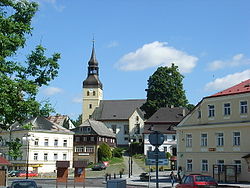| Chřibská | |
|---|---|
| Town | |
 Square with Church of Saint George and birth house of Thaddäus Haenke (far right) Square with Church of Saint George and birth house of Thaddäus Haenke (far right) | |
 Flag Flag Coat of arms Coat of arms | |
 | |
| Coordinates: 50°51′48″N 14°28′59″E / 50.86333°N 14.48306°E / 50.86333; 14.48306 | |
| Country | |
| Region | Ústí nad Labem |
| District | Děčín |
| First mentioned | 1352 |
| Government | |
| • Mayor | Jan Machač |
| Area | |
| • Total | 15.93 km (6.15 sq mi) |
| Elevation | 387 m (1,270 ft) |
| Population | |
| • Total | 1,341 |
| • Density | 84/km (220/sq mi) |
| Time zone | UTC+1 (CET) |
| • Summer (DST) | UTC+2 (CEST) |
| Postal code | 407 44 |
| Website | www |
Chřibská (Czech pronunciation: [ˈxr̝̊ɪpskaː]; German: Kreibitz) is a town in Děčín District in the Ústí nad Labem Region of the Czech Republic. It has about 1,300 inhabitants.
Administrative parts
Chřibská is made up of the town parts of Chřibská, Dolní Chřibská and Horní Chřibská, and the village of Krásné Pole.
Geography
Chřibská is located about 21 kilometres (13 mi) northeast of Děčín and 38 km (24 mi) northeast of Ústí nad Labem. Most of the municipal territory lies in the Lusatian Mountains and in the eponymous protected landscape area. The western part of the territory extends into the Elbe Sandstone Mountains and a small part of Chřibská also lies in the Bohemian Switzerland National Park. The highest point is the Spravedlnost hill at 533 m (1,749 ft) above sea level. The Chřibská Kamenice River flows through the town.
History
The first written mention of Chřibská is from 1352. It was part of the Kamenice estate, owned by the Wartenberg family until 1614, when it was bought by the Kinsky family. Town rights were granted in 1570.
Along with other parts of the former Austrian Empire, Chřibská became part of Czechoslovakia in 1919. From 1938 to 1945, after the Munich Agreement, Chřubská was annexed by Nazi Germany and administered as part of Reichsgau Sudetenland. The expulsion of Germans after World War II in 1945–1946 reduced the population.
In 2006, the town status was returned to Chřibská.
Demographics
|
|
| ||||||||||||||||||||||||||||||||||||||||||||||||||||||
| Source: Censuses | ||||||||||||||||||||||||||||||||||||||||||||||||||||||||
Economy

The oldest running glass production in Europe is located in Horní Chřibská. It was founded shortly after 1500 by the German-Bohemian glass-maker family Friedrich.
Transport
The train station Chřibská on the railway line Děčín–Rumburk, which serves the town, is located east of the town in the territory in neighbouring Rybniště.
Sights
The main landmark of Chřibská is the Church of Saint George. The original Gothic church was rebuilt in the Renaissance style in 1596. Later it was modified in the Gothic style again, and two Baroque chapels were added.
Notable people
- Thaddäus Haenke (1761–1816), botanist and explorer
References
- "Population of Municipalities – 1 January 2024". Czech Statistical Office. 2024-05-17.
- ^ "Historie". Město Chřibská. Retrieved 2023-06-12.
- "Historie kraje" (in Czech). Obec Jetřichovice. Retrieved 2023-06-12.
- "Ústecký kraj" (in Czech). Czech Statistical Office. Retrieved 2023-06-12.
- "Historický lexikon obcí České republiky 1869–2011" (in Czech). Czech Statistical Office. 2015-12-21.
- "Population Census 2021: Population by sex". Public Database. Czech Statistical Office. 2021-03-27.
- Friedrich, Walter A. (2005). Die Wurzeln der nordböhmischen Glasindustrie und die Glasmacherfamilie Friedrich (in German). Fürth. ISBN 3-00-015752-2.
{{cite book}}: CS1 maint: location missing publisher (link) - "Detail stanice Chřibská" (in Czech). České dráhy. Retrieved 2024-07-10.
- "Kostel sv. Jiří". National Heritage Institute. Retrieved 2022-05-27.
External links
- Official website
- History of Chřibská on luzicke-hory.cz (in Czech)
- Virtual show